Hirsch v. Logli Revisited
In the wake of Nifong's disbarment and forced resignation, a similar debate has been waged through newspapers and other venues across the country. Prior to examining the current arguments, we are presenting the Hirsch-Logli exchange to demonstrate that Nifong's misconduct and the resulting consequences of his actions has done little to impact the entrenched positions on either side of the debate.
Hunger for convictions leads many prosecutors to hide evidence that could prove innocence.
By Alan Hirsch
Originally published in the Los Angeles Times June 21, 2006
BY ALL APPEARANCES, the sexual assault case against three members of the Duke University lacrosse team involves serious prosecutorial misjudgment, if not downright misconduct.The Case for Episodic Prosecutorial Misconduct:
Michael B. Nifong, the Durham County, N.C., prosecutor, made public accusations long before the conclusion of the investigation and now forges ahead even as DNA, witness statements, medical reports and other evidence lead impartial observers to find the case ridiculously weak.
Sadly, such conduct is not uncommon. Prosecutors blatantly or subtly overstep professional bounds all too frequently. In a 2003 study, the Center for Public Integrity found that, since 1970, trial and appellate courts cited prosecutorial misconduct as a factor when dismissing charges, reversing convictions or reducing sentences in more than 2,000 cases. In thousands more, courts labeled prosecutorial behavior inappropriate but upheld convictions nevertheless.
The New York-based Innocence Project, whose DNA testing has led to the exoneration of 180 wrongly convicted people in the last 15 years, has studied these cases. It cites the following prosecutorial abuses as contributing to the punishment of the innocent: suppression of information favorable to the defense, knowing use of false testimony, improper closing arguments, coerced witnesses, false statements to the jury and fabrication of evidence.
Maybe such shenanigans will seem unsurprising — just a case of lawyers being lawyers. As the joke goes, what's the difference between lawyers and liars? The pronunciation. (I can make the joke. I'm a lawyer.) But prosecutors are supposed to be different. They are public servants who are supposed to be committed to justice rather than the single-minded pursuit of victory. The Supreme Court has referred to their "twofold aim": to ensure that "guilt shall not escape or innocence suffer."
Why is the second half of that command often neglected? Why do some prosecutors seem indifferent to the risk that their behavior will result in punishment of the innocent? The answer to these questions involves a combination of at least three factors.
First, the asymmetry of the criminal justice system arguably places unrealistic demands on prosecutors. Defense attorneys may pursue acquittals without regard for truth and are subject to few ethical constraints. For example, defense attorneys generally are not bound to share evidence unfavorable to their client, but a prosecutor's failure to share exculpatory material is a serious no-no likely to result in a conviction being reversed. Prosecutors understandably aren't fond of unequal combat. With trials structured as zero-sum competitions featuring a clear winner and loser, they resist allowing their opponent overwhelming tactical advantage.
Personal ambition compounds competitive instincts. Many prosecutors are elected. They wish to be re-elected and often aspire to higher office. One rarely wins popular acclaim for the indictment not brought (because of doubts as to guilt or because evidence was illegally obtained) or the case lost (because of appropriate restraint). Professionalism in prosecution can be subtle and unpublicized, whereas wins and losses are out there for everyone to see. Moreover, restraint is easily mistaken for weakness, rashness for strength. Today, Nifong receives criticism for prosecuting the lacrosse players, but at the time he charged ahead with the decision, public pressure pushed toward aggressive action.
Another cause of prosecutorial misconduct is the deep-seated human need to rationalize away our errors. It would be awfully difficult now for Nifong to admit — to himself — that he shouldn't have brought charges. He retains the discretion to drop the charges, but it would amount to an admission that he has shattered the lives of several innocent people. Who among us is capable of acknowledging mistakes of such magnitude?
The role of rationalization is on clearest display after DNA exonerates those already convicted. The occasional brave prosecutor will apologize and take action to release the man he or his office wrongly put behind bars, but more often the prosecutor refuses to admit the obvious. Though he routinely argues to juries about the infallibility of DNA evidence, now he isn't so sure. Or, though he advanced a theory about the defendant's guilt with certainty, he now abandons that theory while nevertheless maintaining the belief in guilt.
Consider the case of Earl Washington, a mentally retarded man convicted of rape and murder in Virginia who never should have been prosecuted. The case against him consisted of a wildly inaccurate confession, whose errors included misidentifying the race of the victim. Some time after Washington's conviction, DNA testing ruled him out as the source of the seminal fluid found in the victim. The prosecution merely changed its theory of the case, arguing that Washington was not the rapist but an accomplice. They stuck to that story (supported by zero evidence) even after Washington received a pardon and even though no neutral observer has found his guilt a realistic possibility.
Prosecutorial misconduct should not surprise us. Prosecutors are lawyers (intent on victory), politicians (craving popularity) and human beings (needing to rationalize serious errors). The question is what medicine can be prescribed to treat the malignant influences on their behavior. The solution begins with the right kind of public pressure. We must judge prosecutors by much more than how many headlines and convictions they muster.
99 Canal Center Plaza, Suite 510, Alexandria, Va 22314
703.549.9222 / 703.683.0356 fax
www.ndaa-apri.org
Letter to the Editor – LA Times – June 26, 2006
Paul A. Logli
President, National District Attorneys Association
& State’s Attorney, Winnebago County, IL
As President of the National District Attorneys Association and State’s Attorney in Rockford IL for 20 years, I was astonished to read Alan Hirsh’s ill conceived Op-Ed of June 21, 2006, “Overzealous Prosecutors, Cross-Examine Yourselves.” Mr. Hirsch displays a stunning lack of knowledge about the daily conduct and exemplary service of our nation’s prosecutors – the “people’s attorneys.”
Mr. Hirsch, in an effort to denigrate the prosecutor in the Durham, NC alleged rape case, conjures up the hubris to say that it is not uncommon for “prosecutors [to] blatantly . . . overstep professional bounds all too frequently.” He references a 2003 study by the Center for Public Integrity (the Center) that found “Since 1970, trial and appellate courts cited prosecutorial misconduct as a factor when dismissing charges, reversing convictions or reducing sentences in more than 2,000 cases.” Keep in mind that since 1970 prosecutors have achieved millions of convictions of felons in our state courts.
What Mr. Hirsch does not say is that the Center, in responding to a District Attorney’s letter that questioned the accuracy of their report, stated on their website, “We agree that prosecutorial misconduct is episodic, not epidemic. We never said – or meant to imply – otherwise.” It seems that Mr. Hirsch has no qualms about presenting the public with his obviously jaded interpretation of “The Center’s” findings.
Mr. Hirsch also mentions the “Innocence Project, whose DNA testing has “exonerated” 180 wrongly convicted people in the last 15 years. Terms used by experts are important, and the term “exonerated” does not mean “factually innocent.” It is also important to note that during that 15-year period there were over 15-million felony convictions across America. The error rate is almost too small to estimate, but would be something like .03%. That means that prosecutors had a success rate of about 99.97% of achieving a conviction that has stood up under appeal. Additionally, the actual number of people taken off death row by DNA is less than 10 people.
Mr. Hirsch further promotes the tired mantra of the Innocence Project, and others, by attempting to lead readers to believe that prosecutors regularly suppress information, use false testimony, fabricate evidence, and convict the innocent. This assertion is an outrage. The fact is that in our criminal justice system, the burden of proof of guilt beyond a reasonable doubt lies solely with the prosecutor. Prosecutors are held to the highest standards of ethical conduct, and that’s the way it should be. Prosecutors are the only lawyers in the courtroom who are responsible for seeking the truth wherever it leads them, ensuring that justice prevails on behalf of defendants and victims alike.
When prosecutors make a mistake, no matter if it is unintentional or technical, it is called “prosecutorial misconduct.” When a defense attorney makes a mistake, it’s called “ineffective assistance of counsel.” And when a judge makes a mistake, it’s referred to as “judicial error.”
Clearly, the terminology denotes that prosecutors are held to the highest standard of professional and ethical conduct in the courtroom. And they diligently, and most often successfully, perform in accordance with the standards to which they must adhere.
Another erroneous statement by Mr. Hirsch is that prosecutors systematically work to disallow the use of DNA testing of people who have already been convicted, prior to the use of DNA, and are serving time in prison. The truth is that prosecutors have, since the inception of DNA, staunchly promoted its use during the investigation, trial, and post conviction of a criminal – but only if it can conclusively prove guilt or innocence.
While our system of justice is not perfect, and mistakes are made, they occur in extraordinarily small numbers. The people of America can rest assured that prosecutors are overwhelmingly honest, ethical and committed to keeping communities safe. Everyday they serve the victims of crimes and their families and seek the appropriate punishment for criminal behavior.
Mr. Hirsch’s, column, of June 21st has grossly twisted the truth and painted a wholly inaccurate picture of prosecutors. It is both interesting and sad that Mr. Hirsch makes no mention of the millions of innocent victims of crime who suffered, immeasurably, at the hands of violent criminals -- but seems to care far more about spreading misconceptions and questionable research concerning our nation’s prosecutors.






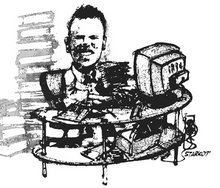
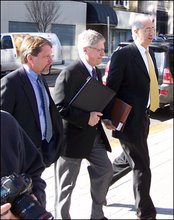
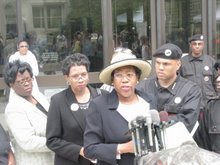
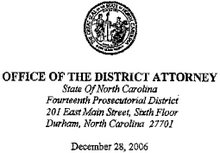
























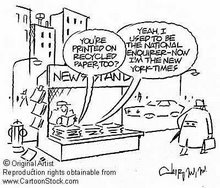





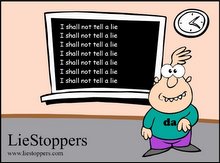






4 comments:
Logli made the mistake of overstating his case and not sounding sufficiently disturbed by prosecutorial misconduct leading the miscarriages of justice. Furthermore, he distorts with statistics. He goes from a supposed .03% error rate from known cases to concluding that in 99.7% of cases justice was done. He shows us evidence of how prosecutors distort facts to obtain convictions.
Got liars?
I guess Logli is now trying to tell us that Nifong is an outlier. Yeah, sure. Nifong made the mistake of getting caught.
Logli is from Rockford, Illinois where I live.
People around here consider it one of the most corrupt jurisdictions in Illinois.
Consider that our Governor is under investigation. Consider that Obama is getting side swiped by the investigation. Consider our previous head crook George Ryan.
You have written an excellent article highlighting a largely hidden problem which poisons the American criminal justice system.
I share your concern and outrage that prosecutors who abuse their power (and there are many who do) are rarely exposed and even less frequently punished.
You might be interested in my just published novel, “A Good Conviction,” which features a wrongful conviction in a high profile Central Park murder, brought about by a prosecutor who knew the defendant was actually innocent and hid the exculpatory evidence that would have led to a not guilty verdict.
Several prosecutors and appeals attorneys helped me with the legal aspects of a Brady appeal in New York State, and all of them agreed that what I portrayed was both realistic and all too possible.
Perhaps you know Steve Cohen, the federal prosecutor who had much to do with the overthrow of convictions in the Palladium case in NYC. Steve was an enthusiastic reader of “A Good Conviction,” and he has been helping me promote the book …
… including a back cover blurb from Judge Leslie Crocker Snyder, former Manhattan Assistant District Attorney and first sex crimes prosecutor in the U.S., who wrote …
“A Good Conviction is a well written, well paced, and fascinating tale of prosecutorial abuse in the Manhattan DA's office. Makes one wonder how many other times something like this has occurred and just how high the abuse is actually sanctioned.”
Dan Slepian, who produced several critically important TV shows about the Palladium case, has written ...
“Having spent countless hours working with detectives, courts, attorneys, and wrongly convicted inmates I was most impressed with how well researched and accurate your narrative was. You really nailed it. In addition, it was a great read.”
I also refer in “A Good Conviction” to the brilliant series done some time ago by the Chicago Tribune, Trial and Error, How Prosecutors Sacrifice Justice to Win, and Maurice Possley, one of the authors, is reading my book and has promised a comment.
You can find A Good Conviction at ...
http://www.amazon.com/Good-Conviction-Lewis-M-Weinstein/dp/1595941622/ref=sr_1_1/103-7341421-1865416?ie=UTF8&s=books&qid=1180587686&sr=8-1
or at my blog …
http://www.agoodconviction.wordpress.com
I'd like to hear from you about whether you think “A Good Conviction” has value in further publicizing the problem of bad prosecutors and the damage they too often do to innocent defendants.
LEW WEINSTEIN
Post a Comment